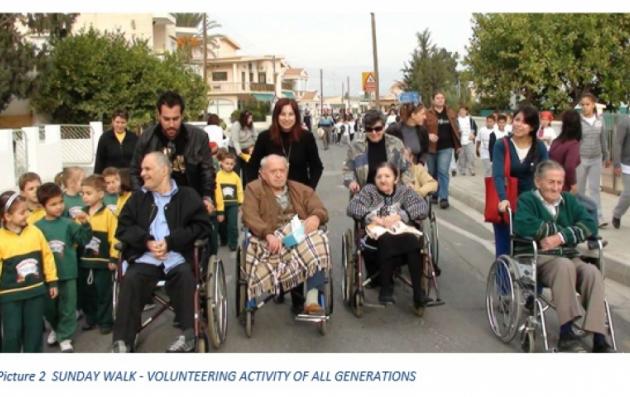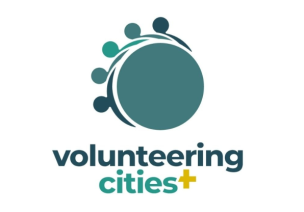Date of label : 02/07/2017
-
Athienou , Cyprus
-
Size of city : 5.017 inhabitants
Previously transferred

Summary
The Municipal Council of Volunteers (MCV) is a stable participatory governance structure that helps coordinate the activities of volunteers, creating synergies among them and enhancing the capacities to reach out groups of the population which need additional support beyond the existing public welfare and social system. The MCV is intergenerational, it is open to everyone in the city and it is a powerful approach to maximise social support especially in small and medium size cities.
The solutions offered by the good practice
Since 1974, with the Turkish occupation of the northern part of Cyprus, Athienou has a special status with its urban area being within the buffer zone ( 80% of its rural area occupied by the Turkish army,) and thus being isolated from other urban center in the Cyprus Island. At that time, many people were in need to restart their lives after the occupation and volunteerism was one of the main tools to rebuild social ties. Athienou today still suffers from isolation and constantly see a resource in the volunteering collaboration between its citizens. Today, voluntarism is well rooted in the social life of the city, institutionalised in 2012 with the creation of a Municipal Council of Volunteers (MCV). Chaired by the Mayor, the MCV counts 48 members elected by the community (local organizations, political parties, parents associations, church and sponsors) . The duty of the MCV is to understand, and offer support, to social problems affecting the inhabitants of the Athienou, especially those most vulnerable. Its work covers different thematic areas such as elderly support, care, life long learning, nursery, energy efficiency, climate change et al. The MCV is currently organised around 4 main projects: 1 the Kleanthios Elderly Home, 2. The Konstanileneion Center for Adults with initiatives related with occupational activities for isolated people and day care activities. In close collaboration with the welfare committee, services are offered with little or no cost to individuals in need, such as food preparing, home-care, and healthcare.3. the Municipal Nursery Center which has a capacity to offer high quality nursery services to 100 babies and infants. Approximately 20 percent of the families that benefit from these services are monitored and receive help by the Municipal Welfare Committee and 4, the Social Welfare Committee. This latter, chaired by the Mayor and with a close collaboration with the Social Welfare Office and the Ministry of Education. Funding comes from individuals, private companies, organised groups and local and/or national authorities.
Building on the sustainable and integrated approach
A key sustainability factor of the MCV initiatives is the intergenerational approach. Children participate in volunteering activities, and this investment at a early age makes them familiarise with a culture of volunteering which will be carried out from generation to generation. For instance, Children in Athnienou pay regular visits to the elderly home in order to attend joint entertainment activities. At the same time, volunteers visit regularly schools engaging kids in storytelling initiatives while encouraging the volunteering engagement.
Vertical integration begins with the volunteers working for MCV, in close collaboration with the municipal authorities. The MCV is under the District Coordinating Council of Volunteerism, which is under the National Coordinating Council of Volunteerism, the National Welfare Office and the Ministry of Labour. With regards to territorial integration, the MCV of Athienou covers the Athienou Municipality and is part of a national network of Volunteering Councils. These efforts also include activities towards environmental sustainability. The MCV members are highly aware of environmental issues and have set a strategy that includes renewable energy sources.
Based on a participatory approach
The MCV architecture is based on the active participation of organised groups within the community. Any citizen can be a member and/or volunteer and the MCV offers a frame for people to assume an active role in support of others depending on the volunteer attitude, skills, professional expertise and time availability. Although, volunteers take the decisions, the committee operates under strict standards, it reports for its actions and it is audited by the legal authorities. The MCV also employs certified staff, dedicated to providing professional support and training of the volunteers. The total number of volunteers exceeds 200 at any given time. The Municipal Council of Volunteerism is composed of 48 members from local organisations and approved by the volunteers. There is a close collaboration with the Welfare Office of the Ministry of Labour, where a budget and sustainability report is submitted annually for additional governmental funding. The president of the Council is the mayor of Athienou. Every programme has an 11-member Coordinating Committee. The president of the Committee is also a member of the Council. Many of the volunteers provide their expertise for the programmes.
What difference has it made?
Despite its long standing tradition of volunteerism in the city, the main barrier today is the low engagement of volunteers in the age group between 25 - 45 years old, and to further address the challenge to reach out the whole population especially people most in needs. The main concern of the improvement plan of the city of Atheniou was therefore to update the work of the MCV with actions involving the youths and specific target groups such as people with disabilities, youth and young professional, and parents of toddlers and school age children. As result from the improvement plan adopted in the Volunteering cities network, the municipality adopted the MunicipalYouth Board, which promotes the ownership of actions by the younger population. Social media have been an important tool for improving this action, as much as the collaboration with school teachers, family of students providing manuals and resources on how to engage in volunteering activities. Another important step was to create stronger linkages with the private sector trough social corporate responsibility achieved by branding the good practice of volunteering.
Transferring the practice
Athienou has greatly invested in transferring its methodology of organising volunteering activities at municipal level. The transferability study highlighted 5 elements of transfer in the governance model,intergenerationality, involvement of young volunteers and corporate citizenship. The overall strategy of the transfer plan is to enhance the volunteerism sustainability cycle as described in the Transfer Network proposal and the Transferability Study:
- Volunteerism greatly contributes to the increase of the quality of life and the progress of the community.
- The intergenerational interaction within the volunteering activities guarantees the sustainability of this volunteerism tradition in the communities
- Bigger engagement and participation of stakeholders increases the effectiveness of the actions and programs that sustain the quality of life and the social evolution.
The methodology has been shared through a guide for transfer resulting from the networks partner cities activities. All cities in the network adopted the Athnieou approach and have been able to launch small scale practices in the lifetime of the network.
-
415_Atheniou_GPsummary.pdf(PDF, 185Ko)


